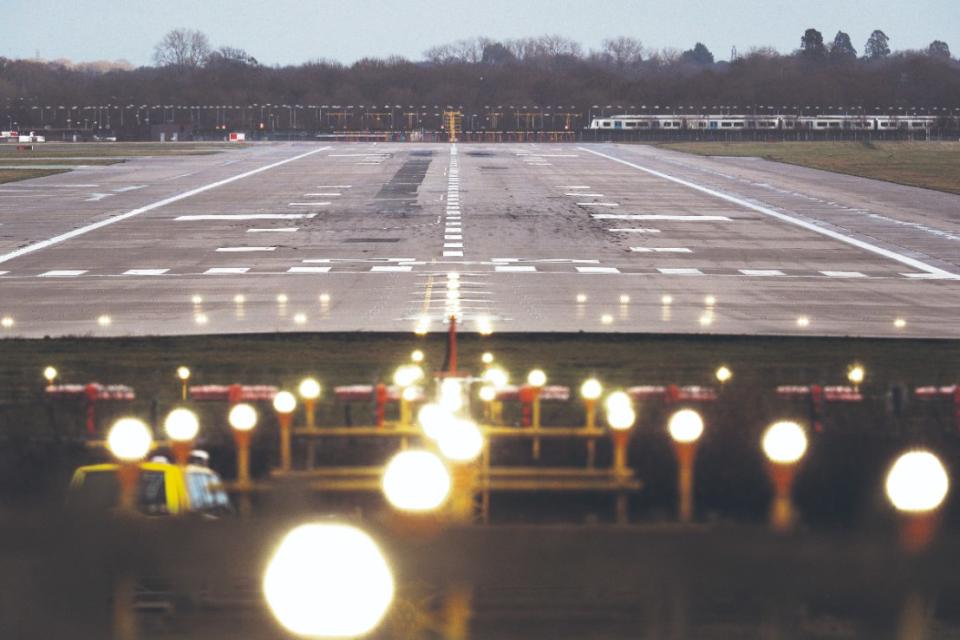Gatwick’s expansion is ‘incredibly important for the UK’, says boss

A key part of Gatwick’s growth plan is a £2.2bn scheme to dramatically increase capacity by bringing its emergency runway into routine use.
It is a huge deal, but the proposals are actually a lot more modest than Heathrow’s expansion plans, which the head of IATA, Willie Walsh, said last week were already dead and buried.
It would essentially involve moving the current runway line around 12 metres from its current position and building new hotels and infrastructure within the airport perimeter. That’s a far cry from Heathrow’s plot to tunnel under a key section of the M25 while building an entirely new strip.
Veteran chief executive Stewart Wingate won’t be drawn on whether he thinks his West London rival will ever follow through. “I think they are definitely years behind us now, but I think I’d rather focus on the merits of our scheme,” he told City A.M.
“I think it’s incredibly important for the UK to, as an island nation, to have peak slots available into London and the South East. We’ve developed a scheme which meets all of the internationally recognised safety standards [and] we’ve developed a scheme that is affordable, very affordable compared to some of the alternatives.”
“From my perspective, this will be the first time that one of the major London airports for many decades has been in a place to be in a position to release peak hourly slots across the day. I think it’s a very, very significant thing to happen for London, the South East and the airports in the South East.”
“I think it’s a very, very significant thing to happen for London, the South East and the airports in the South East.”
Gatwick boss Stewart Wingate on the airport’s expansion plans
Gatwick says the project would create around 14,000 jobs and inject £1bn into the region’s economy. However, it has yet to receive approval from the Planning Inspectorate, and amid political opposition and protests from environmental campaigners, there are a number of questions Gatwick still needs to answer.
Leaving aside the obvious moral conundrum of whether an airport should be expanding amid the ongoing climate crisis, local MPs and its primary airline, Easyjet, has said the airport’s infrastructure and local transport networks are not sufficient to cope with the added capacity.
Gatwick hangs off one railway, the Brighton Main Line, and there are concerns that it could become overloaded alongside neighbouring roads.
Wingate is quick to downplay those fears, noting a £60m investment in upgrading the station. “What we’ve been working on is a project which has just been completed to double the size of our concourse of the rail station because we want to see about 60 per cent of passengers and staff get to and from the airport by public transport.”
Wingate admitted that the environmental concern of doubling passenger capacity to around 75m is something “you have to essentially confront.” He said a lot of work is being done with airlines and fuelling companies to increase the use of greener fuels such as Sustainable Aviation Fuel (SAF) amid a 2050 target of hitting ‘Jet Zero.’
He added the airport was investing in replacing its fleet of support vehicles with electric counterparts, as well as its gas boilers and refrigerants with low carbon alternatives, as part of a £250m project.
His comments are unlikely to appease the scheme’s opponents, and there is no doubt that such a capacity jump would hugely increase emissions.
“Gatwick is the one that has certainly attracted most of my attention. I think it’s because of the potential it has and because of the strength of the London and the South East market and because of the pathways for growing the airport that we’ve identified.”
Gatwick boss Stewart Wingate on the airport’s expansion
Airport expansion itself has long been one of the most controversial areas in infrastructure, and Wingate has received his fair share of backlash for his role in the plans.
Asked how he handles such strong criticism, he said: “I fundamentally agree that businesses should be trying to do everything in their power to try to mitigate their environmental impact.
“If you’re in my seat, you have the ability to go forward to your investors, talk to your investors and if you put the work in with your team to come up with ways in which you can mitigate those environmental impacts, often, what I find is you can actually, you can get your investors to back it up.”
Wingate is certainly no stranger to a challenge. From modest beginnings in County Durham, he rose from an engineer at Black and Decker to stints in the top job at Stansted and Glasgow airports, and as chief executive of Budapest’s main hub during a period it was acquired and then sold.
He admits, though: “Gatwick is the one that has certainly attracted most of my attention. I think it’s because of the potential it has, the strength of the London and the South East markets, and the pathways for growing the airport that we’ve identified.”
The aviation veteran will no doubt have plenty more hours in the office, and the future of Gatwick and its second runway is all the more uncertain given this summer’s general election. Whatever happens, Wingate will relish the challenge.

 Yahoo Finance
Yahoo Finance 